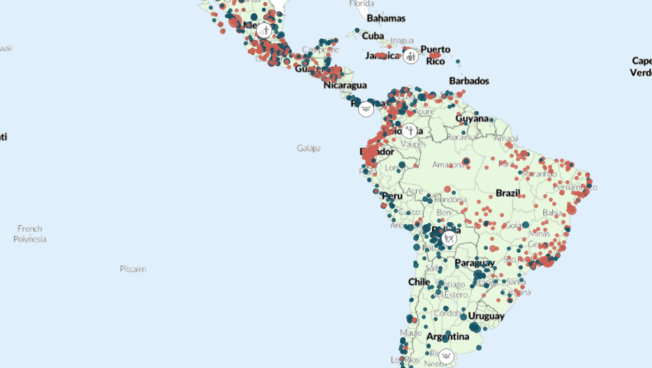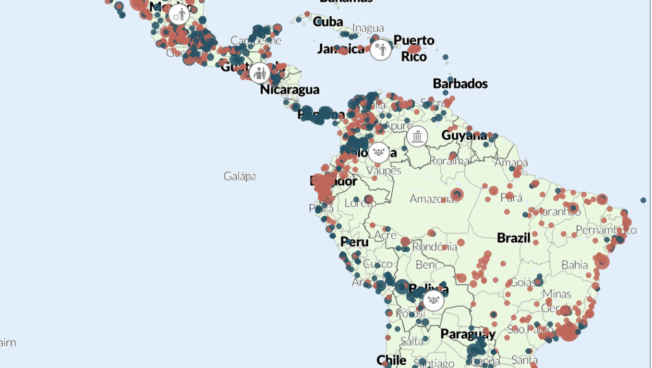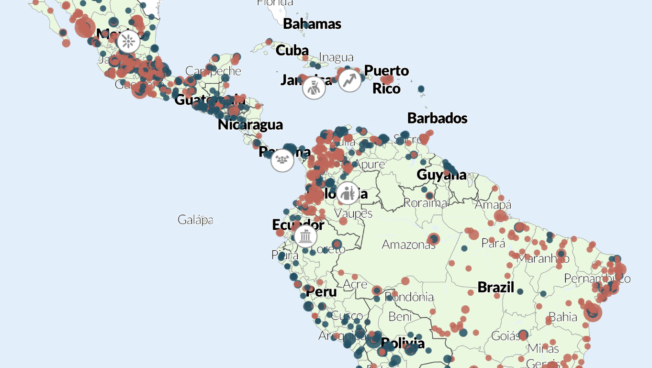Regional Overview
Latin America and the Caribbean
January 2025
Posted: 14 January 2025
In this Regional Overview covering December 2024
- Brazil: Demonstrators call for São Paulo’s security secretary to resign amid rising police brutality
- Colombia: An increase in the use of explosives by armed groups poses further challenges to state forces
- Haiti: Civilians remain vulnerable to gang attacks despite police efforts
- Mexico: Unsolved electoral conflicts drive violence in several states
- Peru: Protests against extortion underline soaring political violence in the country
- Trinidad and Tobago: Back-to-back killings prompt the government to declare a state of emergency
Brazil: Demonstrators call for São Paulo’s security secretary to resign amid rising police brutality
On 5 December, protesters demanded the resignation of Guilherme Derrite, São Paulo’s security secretary, after a video surfaced showing a military police officer throwing a man off a bridge. The incident sparked public outcry against a backdrop of concerns over security forces’ brutality in the state.1G1, ‘Grupo pede saída de Derrite da Segurança em protesto contra a violência policial em frente ao Theatro Municipal de SP,’ 5 December 2024 These concerns come amid an increasingly aggressive approach to policing armed groups in São Paulo. In 2024, ACLED data show 150 incidents of clashes between security forces and non-state armed groups in São Paulo, a 74% increase compared to 2023. These operations also grew deadlier. ACLED records a 36% increase in the lethality rate of clashes and around 170 reported fatalities. On 20 December, over 80 non-governmental organizations filed a document to the Organization of American States denouncing rising police lethality under São Paulo’s far-right governor, Tarcísio de Freitas, who was elected in 2022.2Elaine Patrícia Cruz, ‘Organizações sociais denunciam violência policial em São Paulo à OEA,’ Agência Brasil, 30 December 2024 The document highlighted the growing number of civilian deaths arising from police operations combating organized crime, such as Operation Escudo in 2023 and Operation Verão between 2023 and 2024, and how these operations have disproportionately affected Afro-Brazilian communities.
Brazil’s Federal Supreme Court has called for stricter enforcement of body camera mandates in all operations of military police in São Paulo.3Andre Richter, ‘Barroso determina uso obrigatório de câmeras pela PM de São Paulo,’ Agência Brasil, 9 December 2024 Critics, however, argue that these measures alone are insufficient and are calling for broader structural reforms to address systemic racism and excessive use of force, which remain deeply entrenched in São Paulo’s security policies.4Race & Equality, ‘The Escalation of Police Violence in São Paulo: And Now, Who Protects the Citizens?’ 5 December 2024
Colombia: An increase in the use of explosives by armed groups poses further challenges to state forces
On 7 December, a member of the Revolutionary Armed Forces of Colombia (FARC) Jaime Martínez dissident front, which is affiliated with Central General Staff (EMC), set off a motorcycle bomb at a police checkpoint in Jamundí, Valle del Cauca, killing himself and a police officer and injuring 13 people. The use of explosives is not a new tactic used by armed groups to attack security forces,5Comisión de la Verdad, ‘Hay futuro si hay verdad, Informe Final, Tomo 4, Hasta la guerra tiene límites: violaciones de los Derechos Humanos, infracciones al Derecho Internacional Humanitario y responsabilidades colectivas,’ August 2022 but it increased by around 50% in 2024, as peace negotiations between the EMC and the National Liberation Army (ELN), which contributed to an overall reduction in violence between armed groups and state forces in 2023, faltered. Events involving the use of explosives rose in particular in the Cauca, Valle del Cauca, and Norte de Santander departments, where both the EMC and the ELN have a significant presence. One particular development concerns the use of drones charged with explosives, a tactic mostly employed by the EMC to target security forces. The use of these drones was quite rare in the past, but in 2024 ACLED records at least 30 events involving drones charged with explosives.6Juan Pablo Patiño, ‘Disidencias han propinado 20 ataques con drones en lo que va del 2024,’ El Colombiano, 24 June 2024 In June, Defense Minister Iván Velásquez stated that the military’s anti-drone capacity was insufficient and vowed to improve it.7Daniel Jerez, ‘MinDefensa reconoce que necesita “incrementar capacidades” ante los ataques con drones,’ La FM, 18 June 2024 This development represents not only a challenge for state forces but also threatens to complicate the conflict and further expose civilians.
Haiti: Civilians remain vulnerable to gang attacks despite police efforts
Gangs in Port-au-Prince and the Artibonite department carried out retaliatory attacks against civilians in December, leading to a spike in reported fatalities, turning the month into the deadliest for civilians since 2018. Several massacres drove the spike in civilian fatalities. Between 6 and 8 December, the Wharf Jérémie gang led by ‘Micanor’ executed at least 207 residents in Cité Soleil8United Nations Integrated Office in Haiti, ‘Haiti Flash Report: 207 People Executed by the Wharf Jérémie Gang (Port-au-Prince),’ 23 December 2024 after a Voodoo priest suggested they were using witchcraft to cause the illness of the gangster’s son.9RFI, ‘Haïti: au moins 184 morts ce week-end dans un massacre orchestré par un chef de gang, selon l’ONU,’ 9 December 2024 On 10 December, members of Gran Grif, Lika, and Palmiste gangs attacked several villages in Artibonite, reportedly killing at least 70 residents. The attacks were carried out in retaliation for a joint intervention by police and Kenya-led Multinational Security Support (MSS) directed at reclaiming a police station, which resulted in the killing of at least 30 gangsters by a self-defense group. These massacres, alongside a gang assault on the key Bernard Mevs hospital in Port-au-Prince, prompted the transitional presidential council to announce a state of emergency from 22 December to 21 January and the formation of a national security council.10Alter Presse, ‘Crise : Les autorités de la transition instaurent un Conseil national de sécurité et l’état d’urgence en Haïti,’ 19 December 2024
In 2024, police intensified operations against gangs to curb their territorial expansion and direct attacks, leading to a 40% rise in clashes between security forces and gangs. Despite international support, including the Kenya-led MSS deployment in mid-2024, recent massacres highlight the mixed results of anti-gang operations in reducing violence and gang control. Notwithstanding the extension of the MSS mandate for another year11Vibhu Mishra, ‘Security Council renews Haiti mission mandate, calls for more action against gangs,’ UN News, 30 September 2024 and the deployment of Central American officers in January,12Reuters, ‘Central American troops arrive in Haiti to fight gangs,’ 4 January 2025 significant challenges remain for security forces to contain gangs and protect civilians as the transitional authorities aim to lead Haiti toward elections by 2026.
Mexico: Unsolved electoral conflicts drive violence in several states
In December, several violent incidents highlighted how the threat against elected officials in Mexico extends well beyond the voting cycle. On 9 December, armed men killed Benito Aguas, a federal deputy of the Mexican Green Party in Zongolica, Veracruz state.13Thomas Graham, ‘Mexico federal congressman shot dead in Veracruz state,’ The Guardian, 10 December 2024 He was elected to the Chamber of Deputies in June 2024. Although the perpetrators remain unknown, these attacks are often related to criminal groups’ attempts to control authorities. Political rivalries can also fuel violence: On 17 December, police arrested the former mayor of Tancanhuitz in San Luis Potosí state for allegedly orchestrating the killing of the mayor of the city who had taken office two days earlier.14Nancy Lizet Hernández, ‘Detienen a segundo implicado en asesinato de edil Jesús Franco Larraga en San Luis Potosí; también fue alcalde de Tancanhuitz,’ El Universal, 17 December 2024 In 2024, ACLED records almost 500 events of violence targeting political figures, the highest levels since it started coverage of the country in 2018. While most of this violence occurred in the months before the 2 June general elections, it continued throughout the year.
In Chiapas, unsolved communal conflicts compounded by criminal dynamics fueled violence in Pantelhó. The municipality remains a battleground between Los Herrera — a group linked to the power broker Herrera family accused of ties to organized crime — and El Machete, a self-defense group formed in July 2021 to challenge their dominance. Between 3 and 4 December, clashes erupted in Pantelhó, and El Machete seized the city hall until 7 December, when it left the building after negotiations with state authorities.15Animal Político, ‘Alcaldía de Pantelhó, Chiapas, es liberada por autodefensas “El Machete”, persisten denuncias de acoso a mujeres y niños,’ 8 December 2024 The ongoing conflict had already derailed local elections that were meant to be held in June but were postponed and later canceled due to unrest.16Cuarto Poder de Chiapas, ‘Pantelhó ya tiene Concejo Municipal,’ 1 October 2024 Following the suspension of the local elections, the state electoral council appointed a municipal councilor for Pantelhó, but El Machete opposed the selection, claiming it favored Los Herrera’s interests.17Animal Político, ‘Autodefensas toman presidencia municipal en Pantelhó, Chiapas, tras horas de enfrentamientos; hay decenas de familias desplazadas,’ 5 December 2024
Peru: Protests against extortion underline soaring political violence in the country
On 10 December, International Human Rights Day, hundreds of people — mostly public transport and construction workers — marched in Lima to protest against growing extortion and ineffective government measures.18Valeria Mendoza Talledo, ‘Paro de transportistas hoy martes 10 de diciembre: gremios del sector marchan contra las extorsiones por la Av. Abancay, en el centro de Lima,’ Infobae, 10 December 2024 It was one of nearly 200 demonstrations of this kind that took place in Peru in 2024, marking a nearly five-times increase compared to 2023, with notable surges in Lima and other departments such as La Libertad, Junin, Puno, and Piura. The rise in security-related demonstrations reflects a notable deterioration in the country’s security situation. ACLED records 222 events of political violence in 2024, the highest levels since it started coverage of the country in 2018. A surge in mob violence events and armed attacks drove the increase, especially against social leaders and local administrators, as extortion, illegal mining, and drug trafficking rings strengthened throughout the country.19Will Freeman, ‘Peru’s Anti-Law Enforcement Turn Is a Threat to Regional Stability,’ Americas Quarterly, 26 August 2024 The government of Dina Boluarte has failed to address the security crisis so far. It declared various temporary states of emergency that did not rein in violent crime and promoted legislation that limits the definition of criminal organizations and restricts security forces’ ability to carry out raids. This has, in turn, fueled further public outcry and unrest.
Trinidad and Tobago: Back-to-back killings prompt the government to declare a state of emergency
On 30 December, the government announced the implementation of a state of emergency following the killing of at least seven people between 27 and 29 December, five of whom fell victim to a single shooting in Laventille. Police attribute a large share of murders in the country to revenge killings between gangs.20Kenneth Mohammed, ‘Trinidad and Tobago declares state of emergency after weekend of violence,’ The Guardian, 30 December 2024 Gang-related violence has steadily increased since ACLED began covering Trinidad and Tobago in 2018, spreading across a growing number of locations. In 2024, violent incidents took place in at least 90 locations, a 28% increase compared to the number of affected communities in 2018. The newly declared emergency measures grant police sweeping powers, including the authority to arrest individuals without charging them for 48 hours and the ability to search homes without a warrant.21Loop News, ‘11 things to know about T&T’s State of Emergency regulations,’ 1 January 2025 However, experts caution that while these measures may provide short-term relief, they fail to address the root causes of violence, such as the widespread availability of weapons and drugs.22Frances Robles and Prior Beharry, ‘Trinidad and Tobago Declares State of Emergency Over Rising Crime,’ The New York Times, 30 December 2024 Trinidad and Tobago’s strategic location as both a destination and transshipment point for illicit goods has exacerbated this issue, fueling gang activity. In light of rising gang violence in the country and mounting public concerns, security is expected to become a central issue in the upcoming 2025 elections, scheduled for 10 August.
See More
See the Codebook and the User Guide for an overview of ACLED’s core methodology. For additional documentation, check the Knowledge Base. Region-specific methodology briefs can be accessed below.
Links:







